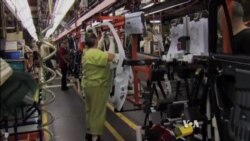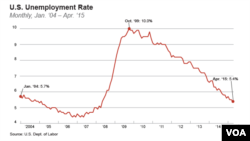The U.S. job market rebounded in April, with strong growth in business services, health care and construction, Friday's report from the Labor Department said. The unemployment rate dipped to 5.4 percent, the lowest level in nearly seven years, as 223,000 jobs were added.
After the weak job gains in March, when fewer than 100,000 people were hired, the second quarter is off to a good start, Bankrate.com's chief financial analyst Greg McBride told VOA.
"The April jobs report shows we are back on track," he said. "It really reveals that March was the aberration — that was the month where the results were very poor, and they were revised lower with [Friday's] release. But, you know, April really kind of gets us back in the game."
April's job numbers were an encouraging sign for investors, who helped boost stock prices on Wall Street by more than 1 percent. Adding to the optimism was the fact that average hourly earnings increased, but just barely. At just 3 cents more per hour, McBride said, it's a step in the right direction, but not enough to significantly boost growth.
"People don't have enough spending power," he said. "They don't have enough breathing room in the household budget, and that's why we've had this perpetually slow-growth economy — because consumers are not in a position where they can ramp up spending on a consistent basis."
Until employers start ramping up wages, McBride said, the housing market is likely to remain sluggish. Part of the problem, according to the National Association of Business Economics' Ken Simonson, is inertia.
"Employers have been very cautious about hiring people, raising wages, and workers are also nervous that a job won't last," he said, "so it's made them less aggressive about pushing for wage increases in their current job or changing jobs."
That could change as competition for skilled workers heats up.
The new jobs data show about 8.5 million Americans are still out of work, but that's down more than 1 million from a year ago.






